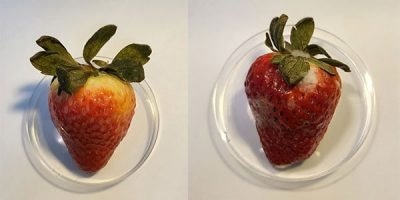To extend the shelf life of the berries, researchers integrated cannabidiol—a non-hallucinogenic cannabis component known as CBD—and sodium alginate into an edible antimicrobial coating.
 A strawberry enveloped in an edible CBD coating (left) still appeared fresh compared to an untreated berry (right) after 15 days. Image Credit: Adapted from ACS Applied Materials & Interfaces 2023.
A strawberry enveloped in an edible CBD coating (left) still appeared fresh compared to an untreated berry (right) after 15 days. Image Credit: Adapted from ACS Applied Materials & Interfaces 2023.
The study was published in ACS Applied Materials & Interfaces.
CBD is popular due to its possible therapeutic properties. This cannabinoid, on the other hand, has been proven to have antioxidant and antibacterial properties. CBD has been shown in past research to inhibit the growth of certain bacteria and harmful fungi, such as those that cause fresh fruits and vegetables to rot.
However, before the oily compound can be broadly absorbed into foods or employed for food preservation, it must be equally distributed in water. One possibility is to encapsulate CBD molecules in edible polymers.
Pongpat Sukhavattanakul, Sarute Ummartyotin, and coworkers intended to explore if a food coating containing CBD-filled nanoparticles could improve antimicrobial activity while also extending the freshness of strawberries.
The CBD was encapsulated in poly(D,L-lactide-co-glycolide), a biodegradable polymer utilized in drug delivery, and the particles were 400 nm in diameter. They combined the most stable nanoparticles, which contained 20% CBD by weight, with sodium alginate in water.
Strawberries were then immersed in solutions containing varying concentrations of nanoparticles before being dipped again in an ascorbic acid and calcium chloride mixture to transform the colorless covering into a gel.
The strawberries, both untreated and treated, were then stored in open plastic containers in the refrigerator. CBD-treated samples ripened and decayed much more slowly than untreated samples after 15 days, perhaps due to reduced microbial growth.
The coating with the most CBD-loaded nanoparticles kept the berries’ dark red color, increased their antioxidant activity, and provided the most antimicrobial protection during storage, implying that this version would have the longest shelf life.
According to the researchers, their findings show how encapsulated CBD can be used to develop a colorless antimicrobial covering for active food packaging.
The study was funded by the Thammasat University Research Unit in Textile and Polymer Chemistry and a Thammasat Postdoctoral Fellowship.
Journal Reference:
Sukhavattanakul, P., et al. (2023). Influence of a Transparent and Edible Coating of Encapsulated Cannabidiol Nanoparticles on the Quality and Shelf Life of Strawberries. ACS Applied Materials & Interfaces. doi.org/10.1021/acsami.3c04036.